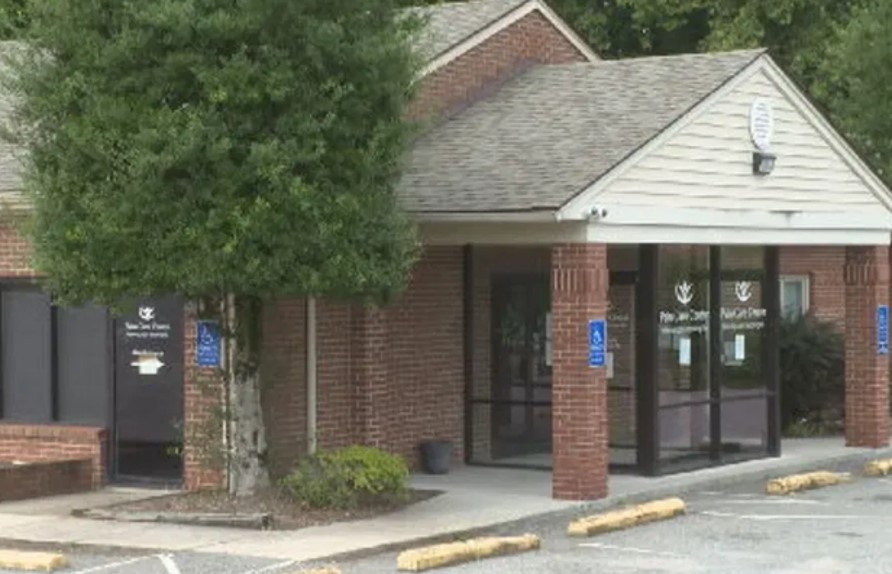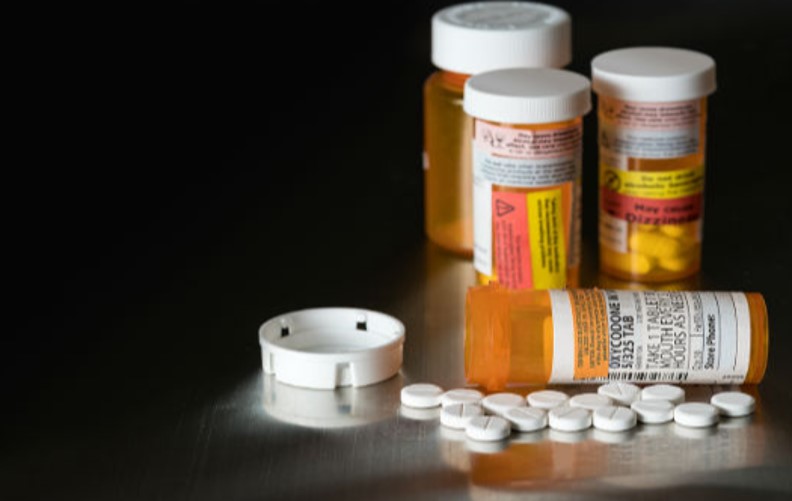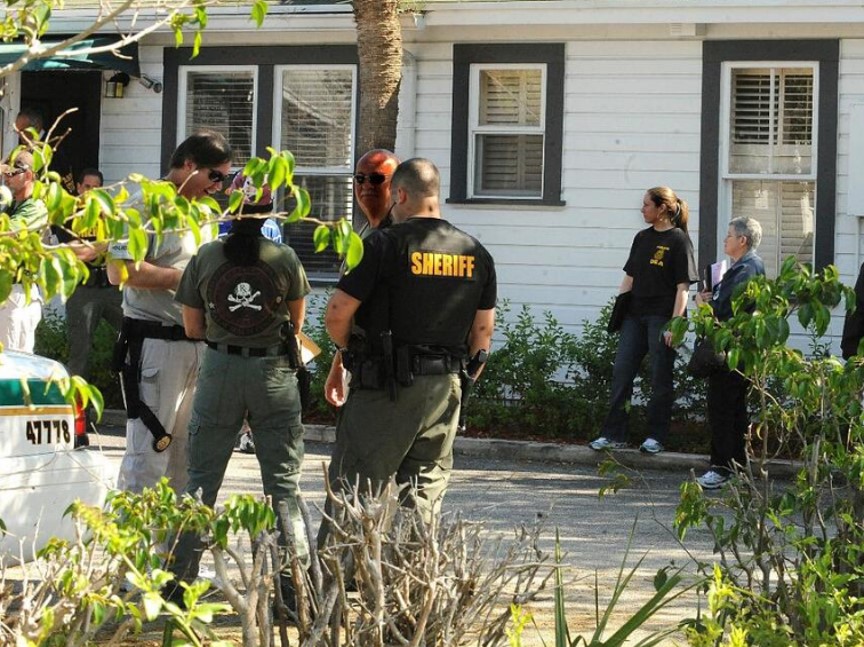
Investigation Reports. Doctors, pain relief centers, and co-conspirators convicted on hundreds of counts of unlawfully distributing opioids to patients without a legitimate medical purpose or beyond the bounds of medical practice.
Federal prosecutors accused Dr. Kirsten Van Steenberg-Ball, 69, of issuing illegal prescriptions for more than 1 million oxycodone pills. Dr. Ball, a primary care physician, operated a medical practice out of her Arlington home. Dr. Ball ran the drug distribution for more than a decade through a network of people posing as patients to whom she illegally prescribed oxycodone pills, according to the prosecution’s evidence.
The doctor’s office manager, Candie Marie Calix, of Front Royal, was sentenced to seven years in prison for conspiring to distribute oxycodone. Court records show that Dr. Ball prescribed Calix, also a patient, approximately 50,000 oxycodone pills over about 10 years.
The Virginia Department of Health Professions investigated Dr. Ball in 2014, 2015 and 2021 for excessive and improper prescribing of oxycodone. Dr. Ball falsified records that she submitted to the department to cover up the fact she prescribed the drug to patients for no legitimate reason and outside the course of professional practice, according to evidence prosecutors presented at trial.
Evidence also revealed that Calix, at Dr. Ball’s direction, recruited other people, including several immediate family members, to become patients so the doctor could prescribe similarly large amounts of oxycodone to them. Calix then sold the tens of thousands of pills that Dr. Ball had prescribed. The prosecution also presented evidence to show that Dr. Ball prescribed oxycodone to drug traffickers and drug addicts in exchange for hundreds of dollars. Several patients became addicted to oxycodone.
Virginia’s Prescription Monitoring Program provides information to authorized law enforcement agents and regulatory personnel to assist with criminal or licensee investigations.
WEST VIRGINIA. According to court documents, Dr. Thomas Romano, 73, of Wheeling, owned and operated a self-named Pain Management Clinic in Martin’s Ferry, to which individuals traveled hundreds of miles to obtain prescriptions for opioids and other controlled substances. Dr. Romano charged $750 for an initial visit and $120 for subsequent monthly visits. The prescriptions Dr. Romano issued for opioids and other controlled substances greatly exceeded recommended dosages and were in dangerous, life-threatening combinations that fueled the addiction of the individuals to whom he prescribed. Between October 2014 and September 2019, Dr. Romano prescribed over 137,000 pills, including opioids, benzodiazepines, and muscle relaxants, to nine individuals.
The jury convicted Dr. Romano of 24 counts of unlawful distribution of a controlled substance outside the usual course of professional practice and not for a legitimate medical purpose to nine individuals. He faced a maximum penalty of 20 years in prison for each charge.
The Appalachian Regional Prescription Opioid (ARPO) Strike Force is an expansion of the Health Care Fraud Unit’s efforts to swiftly and effectively prosecute white-collar offenses involving prescription drugs. Since its inception in late 2018, ARPO has partnered with federal and state law enforcement agencies and U.S. Attorneys’ Offices throughout Alabama, Kentucky, Ohio, Virginia, Tennessee, and West Virginia to prosecute medical professionals and others involved in the illegal prescription and distribution of opioids. Over the past four years, ARPO has charged over 120 defendants, collectively responsible for issuing prescriptions for over 115 million controlled substance pills.
IMPORTANT NOTE: Not all pain management clinics are engaged in criminal activity. Many clinics across the state operate legally and employ trained personnel and doctors who treat patients who legitimately suffer from pain.
Former CEO of Area Pain Clinics Indicted (Drug Enforcement Agency, September 29, 2023)
Jennifer Ann “Jen” Adams, 50, of Mount Pleasant, South Carolina, is charged with one count of conspiring to commit health care fraud, one count of conspiring to distribute medically illegitimate Schedule II controlled substances, and one count of conspiring to use the DEA registration number of another.
According to court documents, Adams was the chief operating officer and practice manager for several Central and Southwest Virginia pain clinics. These clinics were in Lynchburg, Madison Heights, Woodlawn, Blacksburg, and Christiansburg.
The clinics represented themselves as focused mainly on pain management, which involved the prescribing of Schedule II opioids, as well as opioid addiction treatment, which involved prescribing Suboxone and other drugs.
Adams was aware when clinic employees knowingly wrote prescriptions for Schedule II and Schedule III controlled substances to patients who exhibited warning signs of drug abuse, drug addiction, and drug diversion.
In addition, Adams allowed employees who lacked medical training, experience, and licensing to provide medical treatment and to make and influence medical decisions.
If you are aware of controlled substance violations in your community, you can submit your anonymous tip through the DEA online Tip Line.

MADISON HEIGHTS, VIRGINIA—The Pain Care Center in Madison Heights closed recently, leaving patients wondering where to turn for help.
The pain clinic owner, 57-year-old John Barnes, pleaded guilty to conspiring to use knowingly, in the course of dispensing and distributing a controlled substance, registration numbers issued to others; distributing and dispensing buprenorphine not for a legitimate medical purpose; and knowingly executing and attempting to execute a scheme to defraud health care benefit programs.
Ms. AH said she had been a patient at the Pain Care Center in Madison Heights for about two years. She said there was “no warning… nothing.” She said when she showed up for her appointment, no one was there. However, a sign on the door said to call the clinic. So, she called and left a message but did not hear anything back.
She said it was frustrating not to be able to get ahold of their doctor. “We rely on our medication; it’s a pain management doctor’s office,” she said.
Pain Clinic Owner Pleads Guilty in Health Care Fraud Case (Pat Thomas, WBDJ7, July 28, 2023)
ROANOKE, VIRGINIA. John Gregory Barnes, 57, of South Carolina, had bought clinics in Lynchburg, Madison Heights, Blacksburg, Christiansburg, and Woodlawn. According to court documents, in 2014, despite having no medical training, Barnes bought a medical practice through his company, L5 Medical Holdings. L5 operated pain management clinics, which involved the prescribing of prescription opioids and opioid addiction treatment medications.
After Barnes began operating his pain clinics, said Kavanaugh, those clinics became more focused on prescribing Suboxone and opioids and less focused on interventional treatments. Barnes and L5 “operated the clinics in a manner that prioritized revenue maximization over patient care.” Providers were encouraged to limit patient visits to 15 minutes and see as many as 30 patients daily.
L5 Medical Holdings, the business entity controlled by Barnes, pleaded guilty to the same charge encompassing the same conspiracies, as well as a “conspiracy to distribute and dispense fentanyl, oxycodone, hydrocodone, and morphine not for a legitimate medical purpose” charge. L5 and Barnes jointly agreed to pay almost $4 million in restitution to Medicare and Virginia Medicaid and to forfeit $250,000 to the United States.
“Our investigation into Barnes’ illegal business activities of highly addictive pain medication at the height of the opioid epidemic emphasizes his criminal indifference to human life,” said Special Agent in Charge of the Drug Enforcement Administration’s Washington Division.

5 Doctors Plead Guilty in West Virginia Prescription Pill Scheme (Associated Press, September 2022)
The scheme was tied to the Hope Clinic and involved prescribing oxycodone and other controlled substances that weren’t for legitimate medical purposes from 2010 to 2015. Some prescriptions provided up to seven pills per day, and several Hope locations averaged 65 or more daily customers during a 10-hour workday with only one practitioner working, prosecutors said in a news release.
Hope Clinic had offices in Beckley, Beaver, and Charleston, West Virginia, and in Wytheville, Virginia.
Those physicians are William Earley, 66, of North Myrtle Beach, South Carolina; Brian Gullett, 45, of Clarksville, Pennsylvania; Roswell Tempest Lowry, 88, of Efland, North Carolina; and Vernon Stanley, 79, of Fayetteville, West Virginia.
Gullett, Earley, and Stanley signed numerous oxycodone prescriptions for a customer at a Charleston Hope Clinic in 2013. They admitted that the customer’s medical chart did not support the prescriptions, which were not for a legitimate medical purpose, prosecutors said.
In August 2014, Lowry signed prescriptions for a Hope customer in Charleston for 180 oxycodone pills. He admitted intentionally not reading the customer’s chart to determine if those prescriptions were necessary. Instead, Lowry issued the same prescriptions for the customer that were provided by previous physicians, the statement said.
Gullett, Earley, Lowry, and Stanley admitted the customers reported being addicted to pain medication, had failed or had abnormal drug screenings several times, bought pills on the street, and sold pills from their Hope prescriptions to others. The physicians did not discuss the possibility of addiction or the need for addiction treatment with these customers, the statement said.
Clarkson admitted to helping Hope Clinic issue prescriptions after major retailers had stopped filling them and smaller pharmacies could not meet the demand of Hope customers. In 2014, Clarkson wrote illegitimate prescriptions for a total of 635 oxycodone pills for five different Hope customers in Virginia that were filled at Adkins Pharmacy in Gilbert, West Virginia, prosecutors said. Adkins Pharmacy agreed in 2020 to pay a $88,000 fine.
The physicians were indicted in 2018, along with the owners, managers, and other physicians associated with Hope Clinic and a group that managed Hope’s daily operations.
Was it unreasonable for three of America’s biggest corporations—the drug wholesalers AmerisourceBergen, Cardinal Health, and McKesson—to ship roughly 81 million highly addictive opioid pills to pharmacies in one small Rust Belt city on the Ohio River?
“It was a blowout,” Farrell said. “We had 81 million pills that came flooding into our community. And it wasn’t by accident. Somebody delivered those pills here.”
According to federal data made public during the trial, the pills were shipped to the community from 2006 through 2014, years when America’s opioid epidemic was surging.
Officials in Huntington and Cabell County are asking Faber to award them up to $2.5 billion in damages, money they would use to help ease the opioid crisis.
The companies deny any wrongdoing and say the huge shipments of pills — which they acknowledge occurred — reflected trends in opioid prescribing practices by doctors, which were out of their control.
Public health experts testified that the impact of that “tsunami” of pills has been profound on this community of roughly 91,000 people. One in 10 residents of Cabell County is now believed to be opioid dependent.
ALEXANDRIA, Va. – A former Fairfax doctor was sentenced today to seven years in prison for leading and organizing an extensive and illegal prescription distribution conspiracy and a related healthcare fraud scheme.
According to court documents, Dr. Felicia Lyn Donald, 65, of Great Falls, organized, led, and operated a prescription “pill mill” from at least April 2016 through April 2020. Dr. Donald practiced medicine at For Women OB/GYN Associates and NOVA Addiction Center.
Dr. Donald distributed over 1.2 million milligrams of Schedule II opioids at or above the Centers for Disease Control and Prevention guideline for dosages that a practitioner should avoid, with a total street value of over $1.2 million, and illegally distributed at least 325,190 mg of oxycodone and other Schedule II controlled substances. Donald also committed healthcare fraud on numerous occasions in furtherance of her scheme.
For example, on April 20, 2019, in the Eastern District of Virginia, the defendant FELICIA LYN DONALD, knowingly and willfully executed, and attempted to execute, a scheme and artifice to defraud a health care benefit program affecting commerce, as defined in 18 U.S.C. § 24(b), that is the Virginia Medicaid Program, and to obtain, by means of materially false and fraudulent pretenses, representations, and promises, money and property owned by and under the custody of the Virginia Medicaid Program in connection with the delivery of and payment for health care benefits, items and services by billing for services not rendered and DONALD knew that the sole purpose of B.N.’s visit to DONALD’S office was for B.N. to unlawfully obtain prescription opioids that B.N. could illegally distribute on the street for profit.
“Donald flagrantly betrayed the public’s trust in the medical profession by unlawfully distributing highly addictive and potentially lethal drugs to patients and other individuals,” said G. Zachary Terwilliger, U.S. Attorney for the Eastern District of Virginia. “The Eastern District of Virginia will continue to prosecute doctors who abandon their medical oath and hold them accountable for choosing profits over patients’ lives.”
Dr. Donald admitted that she prescribed opioids to addicts and/or drug dealers who had traveled from out-of-state or long distances to her practice; individuals who informed Donald of their pending drug charges; individuals whom Donald knew had failed urine toxicology screens; individuals who Donald knew were selling the pills that she prescribed to them; individuals who received from Donald opioids and alprazolam, which Donald admitted is a dangerous combination of drugs that could have killed or caused serious bodily injury to the ultimate users; paying certain employees, in part, with opioid prescriptions rather than through paychecks; and giving blank prescriptions to certain members of her medical office staff and other co-conspirators for their personal use.
Dr. Donald attempted to conceal her patterns of illegal prescribing by falsifying medical records to make it appear as though individuals who were never her patients received examinations and medical care when, in fact, they had not, and engaging in Medicaid fraud. Donald fraudulently issued prescriptions to others in the names of at least nine unwitting individuals, none of whom were her patients. Donald also issued prescriptions for high doses of oxycodone to multiple women who were pregnant.
Following her guilty plea on May 4, the Court revoked Donald’s pretrial release on August 7 after the government learned and produced evidence indicating that Donald violated numerous conditions of her release pending sentencing, including 1) Donald admitted that she “made it up” when informing the FBI and jail officials during her arrest that she was exposed to COVID-19; 2) Donald continued to practice medicine for profit; 3) Donald repeatedly communicated with co-conspirators following her guilty plea; 4) Donald made a false certification under penalty of perjury on May 16 to the Small Business Administration (SBA) to obtain a loan in light of the COVID-19 pandemic, including failing to inform the SBA about her guilty plea; and 5) Donald fraudulently used SBA loan and/or Cares Act Paycheck Protection Program COVID-19 loans to fund her personal-related expenses, including thousands of dollars in legal fees related to this case.
The operation of a drug trafficking network peddling prescription drugs for profit under the guise of a medical practice not only violates the law, it undermines the public confidence in the healthcare profession.
ALEXANDRIA, Va. – Two women pleaded guilty yesterday for their respective roles in helping run a “pill mill,” which led to the fraudulent dispensing of thousands of prescription opioid pills.
According to court documents and statements made in court, Kimberly Lancaster, 41, of Haymarket, was the office manager. Susan Alcantara, 29, of Leesburg, was a medical assistant at an addiction/pain treatment clinic and an OB/GYN practice (“The Medical Practices”), which both operated in the same location in Northern Virginia. From June 2018 through June 2019, both Lancaster and Alcantara assisted a physician in operating a prescription “pill mill” at which so-called “patients,” many of whom were cash-paying customers, could obtain medically unnecessary prescriptions.
Lancaster, despite having no medical qualifications or training, often provided medical advice to the physician regarding the dispensing of prescription medications to individuals who were not patients of the physician. Lancaster also falsified medical records on behalf of the physician to make it appear as though patients and individuals who were never patients of The Medical Practices received medical examinations when, in fact, they had not. The physician often paid Lancaster for her services through the issuance of opioid prescriptions. Alcantara filled fraudulent prescriptions for opioid medications in her name and the names of at least four unwitting individuals at various pharmacies in Northern Virginia. Despite being aware of Alcantara’s opioid addiction, the physician provided many fraudulent prescriptions to Alcantara that were written in the names of unwitting individuals whom the physician had never medically examined.
Lancaster and Alcantara’s participation in the prescription fraud scheme led to the fraudulent filling and dispensing of thousands of prescription opioid pills at pharmacies in Northern Virginia. Lancaster and Alcantara’s actions also caused the Medicaid healthcare benefit program to pay for fraudulently dispensed prescription opioids.
Lancaster pleaded guilty to conspiracy to distribute and dispense controlled substances outside the usual course of professional practice and without a legitimate medical purpose and prescription fraud. FBI’s Washington Field Criminal Division.
MARTINSVILLE. A Virginia doctor received a 40-year prison sentence for illegally prescribing more than half a million doses of oxycodone, hydromorphone, fentanyl, and other opioids to patients for years.
Authorities say Dr. Joel Smithers operated a “pill mill” out of Martinsville, about 15 miles north of the Virginia-North Carolina border and about 175 miles southwest of Richmond.
The U.S. District Court for the Western District of Virginia handed down the sentence in a courtroom in Abingdon. The sentence included 20 years for Smithers’ conviction for prescribing opioids that caused the death of a woman in West Virginia. In addition to the prison time, he was assessed an $86,000 fine and will serve three years of supervised release upon completing his prison time, according to court documents. The sentence is lighter than it could have been. Smithers was facing up to life in prison and a fine of more than $200 million, according to officials at the U.S. Justice Department.
Dr. Smithers was convicted by a jury on more than 800 federal drug charges — including one count of possessing with the intent to distribute controlled substances and one count of maintaining a place for the purpose of unlawfully distributing controlled substances.
He was also convicted on hundreds of counts of unlawfully distributing a controlled substance without a legitimate medical purpose or beyond the bounds of medical practice.
When Smithers, a resident of Greensboro, N.C., opened his Virginia practice in 2015, Justice Department officials said he prescribed controlled substances to “every patient in his practice, resulting in over 500,000 Schedule II controlled substances being distributed.”
His Martinsville office was raided by federal agents in 2017.
Authorities say that Smithers ran an operation that was less a medical practice and more an interstate drug distribution network and that patients came from surrounding areas within Virginia, as well as from Ohio, Tennessee, Kentucky, and West Virginia.
Some traveled hundreds of miles to visit Smithers to get their drugs, according to the U.S. Attorney’s Office in the Western District of Virginia.
“Smithers did not accept insurance and took in over $700,000 in cash and credit card payments prior to a search warrant being executed at his office on March 7, 2017,” the statement said.
During the trial, Smithers testified that he received a lot of patients through word of mouth.
“Well, a few patients from Virginia, but most of them, through word of mouth, would come from Kentucky and West Virginia. Those were the main two places,” Smithers said, according to court documents.
“I think there were a few patients from Tennessee because Tennessee had shut down some clinics as well. And, I mean, it was just kind of word of mouth. I never really advertised. I had a sign out in front of my office,” Smithers said.
A man testified during the trial that he would drive between eight and 10 hours from his home in Kentucky to the Virginia practice and back.
The man admitted he was addicted to oxycodone and hydrocodone and began to see Smithers after another doctor refused to give him pills.
“There wasn’t no doctors in my area like that to see,” the man said about why he would make the trek.
What is Oxycodone and How Is It Used (United States Drug Enforcement Administration)

According to the Centers for Disease Control and Prevention, more than 700,000 people died in the United States from drug overdoses between 1999 and 2017, including 70,000 in 2017 alone. Of those 2017 deaths, the CDC said nearly 68% were linked to a prescription or illicit opioid.
Doctors Charged in West Virginia Pill Mill Case (John Raby, Associated Press, February 2018)
CHARLESTON, WEST VIRGINIA— Ten doctors were charged with overprescribing pain pills from clinics in West Virginia and Virginia. Two of those patients died.
Most of the 69-count indictment charges the owners, managers, and physicians associated with Hope Clinic with conspiracy to distribute oxycodone and other controlled substances that weren’t for legitimate medical purposes from 2010 to 2015. Hope Clinic had offices in Beckley, Beaver, Charleston, West Virginia, and Wytheville, Virginia.
The indictment said the defendants allegedly laundered drug proceeds by paying bonuses to physicians and employees of a patient screening firm to encourage prescribing opioids. It said the owners knew customers were drug addicts, adding some customers were prescribed more than 2,000 prescription pills over one year.
“Home-grown drug dealers hidden behind the veil of a doctor’s lab coat, a medical degree, and a prescription pad are every bit as bad as the heroin dealers that flood into West Virginia,” U.S. Attorney Michael Stuart said at a news conference. “We’re not going to tolerate it.”
One of the physicians, Sanjay Mehta, was charged with distributing a controlled substance that caused the deaths of two patients in 2013. In a related case, another physician was charged with conspiracy to commit money laundering.
Owner Dr. James H. Blume Jr. and manager Mark T. Radcliffe faced additional charges of maintaining a drug-involved premises. The indictment said they operated a cash-based clinic, refused to accept insurance, charged in-state customers at least $275 for an initial appointment and at least $160 for each subsequent appointment.
It said patients were not required to have a physician’s referral and that the clinic hired medical professionals with no background or special training in pain management. Thirteen people were charged overall.
Richmond Doctor Accused of Running $650,000 Pill Mill Operation (ABC8News, December 2017)
RICHMOND, VIRGINIA–A local doctor charged with allegedly running an illegal $650,000 oxycodone distribution scheme was sentenced to 30 years in prison.
Dr. Clarence Scranage, a Pain Management Specialist with offices in Richmond, Henrico, and Chesterfield counties, was indicted on 19 felony drug charges in connection to a “pill mill” operation he ran with known and unknown co-conspirators. Scranage had offices at 713 North Courthouse Road in Chesterfield County, 1608 Ownby Lane in Richmond, and 2000 Bremo Road, Suite 205, in Henrico County.
Prosecutors say Scranage worked with an accomplice, Anthony “Tott” Harper of Dewitt, who would recruit patients and refer them to Scranage. Dr. Scranage would then write prescriptions without examining the patients. Other unknown co-conspirators, which included recruiters, pill fillers, and dealers who sold to addicts, were also involved.
According to court documents, Dr. Scranage would receive cash payments in exchange for the prescriptions.
In total, Dr. Scranage dispensed 1,257 fraudulent prescriptions amounting to more than 223,000 30-mg Oxycodone pills.
During the trial, one expert testified that Dr. Scranage was “a one-man opioid epidemic.”

The Dangers of Pill Mills
Pill mills are extremely dangerous because they make it easy for people to abuse opioids. Opioids are a type of drug that is highly addictive and can be very harmful, even deadly, when misused. People who get opioids from a pill mill are more likely to misuse them because they don’t have to go through the proper channels to get the drugs. This means that more people are at risk of developing an addiction to opioids, and more people are likely to overdose on these drugs.
“Holding the opioid manufacturers and distributors accountable is important. Getting some of that money back is important, but you’ll never be able to reimburse the people what they’ve truly lost,” Commissioner Ben Salango said.
Between 1999 and 2017, an estimated 250,000 Americans died from overdoses involving prescription painkillers, a plague ignited by Purdue Pharma’s aggressive marketing of OxyContin. Families, working class and wealthy, have been torn apart, businesses destroyed, and public officials pushed to the brink. Meanwhile, the drugmaker’s owners, Raymond and Mortimer Sackler, whose names adorn museums worldwide, made enormous fortunes from the commercial success of OxyContin.
In Pain Killer, Barry Meier tells the story of how Purdue turned OxyContin into a billion-dollar blockbuster. Powerful narcotic painkillers, or opioids, were once used as drugs of last resort for pain sufferers. But Purdue launched an unprecedented marketing campaign claiming that the drug’s long-acting formulation made it safer to use than traditional painkillers for many types of pain. That illusion was quickly shattered as drug abusers learned that crushing an Oxy could release its narcotic payload all at once. Even in its prescribed form, Oxy proved fiercely addictive. As OxyContin’s use and abuse grew, Purdue concealed what it knew from regulators, doctors, and patients.
Here are the people who profited from the crisis, those who paid the price, those who plotted in boardrooms, and those who tried to sound alarm bells. A country doctor in rural Virginia, Art Van Zee, took on Purdue and warned officials about OxyContin abuse. An ebullient high school cheerleader, Lindsey Myers, was reduced to stealing from her parents to feed her escalating Oxy habit. A hard-charging DEA official, Laura Nagel, tried to hold Purdue executives to account.
In Pain Killer, Barry Meier breaks new ground in his decades-long investigation into the opioid epidemic. He takes readers inside Purdue to show how long the company withheld information about the abuse of OxyContin and gives a shocking account of the Justice Department’s failure to alter the trajectory of the opioid epidemic and protect thousands of lives. Equal parts crime thriller, medical detective story, and business exposé, Pain Killer is a hard-hitting look at how a supposed wonder drug became the gateway drug to a national tragedy.
Understanding Drug Overdoses and Deaths (Centers for Disease Control and Prevention)
Researchers from the Centers for Disease Control and Prevention report that Schedule II prescription painkillers, like oxycodone, cause more drug overdose deaths than cocaine and heroin combined. Oxycodone and other Schedule II drugs have a high potential for abuse and can be crushed and snorted or dissolved and injected to get an immediate high. This abuse can lead to addiction, overdose, and sometimes death.

What Are Some Signs There Is a Pill Mill In Your Community?
Pill mills have been around in almost every one of the United States. However, there are still pill mills opening up around the country. If you suspect there is a pill mill in your community, some signs to confirm this may include the following:
- Cash is the only form of payment accepted.
- Physical exams are not given.
- Prescription pills are the only way doctors treat pain.
- Crowds are formed around the building in lines.
- Many cars are in and out of the building parking lot.
- Pharmacists complain about the doctors.
- Other businesses complain about the office or facility.
- Patients aren’t in the building long for their appointments.
- Shady or unusual characters around the building.
- X-rays and medical records aren’t needed for appointments.
- Doctors send patients to a specific pharmacy.
- Patients can pick what medicine they want.
- Drugs are being used and sold right outside the building.
- Security guards are on the premises.
If you recognize any of these signs, you can submit your anonymous tip through the DEA online Tip Line and report the doctors or facility. Pill mills are a problem. If the citizens of the community report they see signs of suspicious activity and more businesses keep an eye out for the above-mentioned signs as well, hopefully, these pill mills can be limited.
Within the last decade, abuse and misuse of certain prescription drugs, especially pain medications, has become prevalent. The opioid crisis and drug overdoses continue to devastate our states and local communities.
Donations to Support this Website are Always Welcome.
How State and Federal Authorities are Dismantling Pill Mills in the United States
How to Recognize a Pain Pill Mill in Your Community
How Authorities Are Shutting Down Texas Pain Clinics Enormous Pill Prescriptions
How Authorities Are Cracking Down on Rogue Pain Clinics in Florida
Authorities Crack Down on Pharmacists Fulfilling and Dispensing Massive Amounts of Pain Pills
How Pain Clinic Owners Turned Patients’ Pain into Enormous Profits
How Federal Agencies are Shutting Down Maryland Pain Clinics Operating as Pill Mills
How Authorities Have Shuttered Georgia Pain Clinics Massive Pain Pill Distribution
How Authorities Are Cracking Down on Virginia Pain Clinics Massive Pain Killer Pill Operations

Authorities Crack Down on Virginia Pain Clinics Massive Pain Killer Pill Operations
ADD COMMENTS BELOW
- Essential Christmas Songs for the Holiday Season
- Stylish Outdoor Fire Pits and Patio Heaters
- How to Create an Ergonomic Workspace at Home or Work
- Benefits of Humor and Laughter in Life
- Balancing Success: Practical Self-Care Strategies for Entrepreneurs
- Guides to Backpacking, Mountain Biking and Hiking Georgia
- Ways to Pay It Forward and Change Lives
- Email Marketing Campaigns for Small Business Owners
- Guide to Martha Stewart’s Hugely Successful Concept and Art of Presentation
- Guides to Backpacking and Hiking Canada
- Timeline of Events Leading to Rudy Giuliani’s Legal Troubles
- Backpacking, Hiking, and Camping Safety Guides
- Moving and Relocating to Atlanta: How to Find Your New Home
- Money Matters: Insider Tips to Buying a Home
- Renting vs Owning a Home
- Ways to Build Positive Credit
- Do It Yourself Credit Improvement Process
- A Trail of Clues to the Murder of Nicole Brown Simpson
- How Centra Tech’s Bitcoin Cryptocurrency Scheme Was Hatched and Discovered
- Starting a New Business as a New Mother: Tips for Thriving
- Guides to Backpacking and Hiking the Carolinas
- Guides to Hiking New York State and New Jersey
- Guides to Hiking California and Nevada
- The Tragic Murder of Rebecca Postle Bliefnick
- How a Grad Student Murder Spotlights Female Joggers’ Safety Concerns
- How Massive Commercial Financial Fraud Was Discovered in Singapore
- Did Billy Ray Turner Conspire with Sherra Wright to Kill Former NBA Player Lorenzen Wright?
- How Operation Rebound’s 7-Year Cold Case was Finally Solved
- Mastering DIY Marketing: Essential Skills and Strategies for Small Business Owners
- How a GeoLocation Expert Tracked a Killer
- Transgender Law Enforcement Officer Denied Medical Coverage for Gender Dysphoria
- How Video Surveillance Cameras Helped Identify and Track a Killer
- How Investigators Solved the Murder Mystery of Army Sergeant Tyrone Hassel III
- How a Love Obsession Led to the Brutal Murder of Anna Lisa Raymundo
- How Stephen Grant Tried to Get Away with Killing His Wife
- How Unrelenting Catfish Schemes Led to Fatal Suicide
- How Pain Clinic Owners Turned Patients’ Pain into Enormous Profits
- How to Recognize a Pain Pill Mill in Your Community
- How Authorities Have Shuttered Georgia Pain Clinics Massive Pain Pill Distributions
- How Pain Doctors Massive Opioid Prescriptions Lead to Pain Pill Overdose Deaths
- How Authorities Are Dismantling Pennsylvania Pain Clinics Prescribing Excessive Amounts of Opioid Pain Pills
- How Authorities Are Dismantling Alabama Pain Clinics Pain Pill Schemes
- How the Gilgo Beach Homicide Investigation Has Progressed
- How NYC Architect was Linked to Three Women’s Remains Found on Gilgo Beach
- How Investigators Discovered a Serial Killer Hiding in Plain Sight
- How Police Discovered the Concealed Murders of the Chen Family
- How a Vicious Child Custody Battle Led to the Murder of Christine Belford
- How Authorities Finally Captured a Serial Killer in Southern Louisiana
- How Authorities Are Busting Pill Mills in The Carolinas
- How Montgomery County Police Quickly Unraveled the Murder of a Retail Store Employee in Bethesda
- How a Child Rapist and Murderer Almost Got Away with His Crimes in England
- How Authorities Are Dismantling Pill Mills in the United States
- How Federal Agencies Are Dismantling Michigan Pain Clinic Doctors Scheme to Distribute Enormous Amounts of Opioid Pain Pills
- How Authorities Are Cracking Down on Virginia Pain Clinics Massive Pain Pill Operations
- How Authorities Are Honing in on Kentucky Pain Clinics Distributing Opioid Painkiller Pills for Profit
- How Federal Agencies Are Shutting Down Maryland Pain Clinics Operating as Pill Mills
- How Federal Agencies Are Dismantling New York Pain Clinics Vast Pain Pill Operations
- How the Senseless Murder of Tequila Suter Was Quickly Solved
- How Authorities Are Dismantling Ohio Pain Clinics Prescribing Excessive Pain Pills
- How Authorities are Dismantling Tennessee Pain Clinics Prescribing Massive Quantities of Opioid Pain Pills
- How State and Federal Agencies Are Shuttering California Pain Clinics Huge Distribution of Opioid Pain Pills
- How Authorities Are Shutting Down Texas Pain Clinics Enormous Pill Prescriptions
- How Authorities Are Cracking Down on Rogue Pain Clinics in Florida
- George Brothers Used Pain Clinics to Disburse Oxycodone Pain Killer Pills
- How Authorities Have Convicted Pharmacists Fulfilling and Dispensing Massive Amounts of Pain Pills
- Georgia Election Workers Defamation Lawsuit and Trial
- Rudy Giuliani’s Election Fraud Allegations and Ensuing Lawsuits
- British Singer George Michael’s Last Christmas
- Shaping Tomorrow’s Leaders
- Kathleen Peterson’s Mysterious Staircase Death: Accident or Homicide?
- How Police Officer Stephanie Lazarus Almost Got Away with Murder
- Mysterious Staircase Death Investigations
- Elizabeth Ratliff’s Mysterious Staircase Death in Germany
- The Death of Vincent Foster Remains a Mystery 30 Years Later
- Biloxi Murder Conspiracy: A High-Stakes Crime